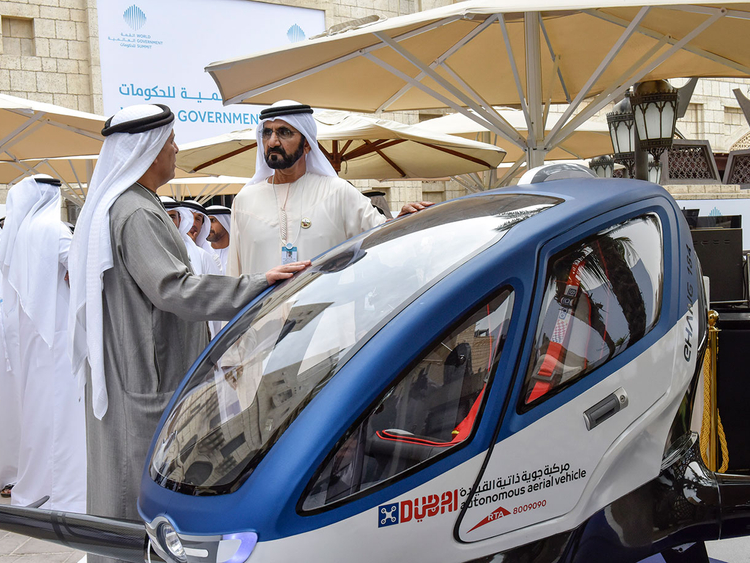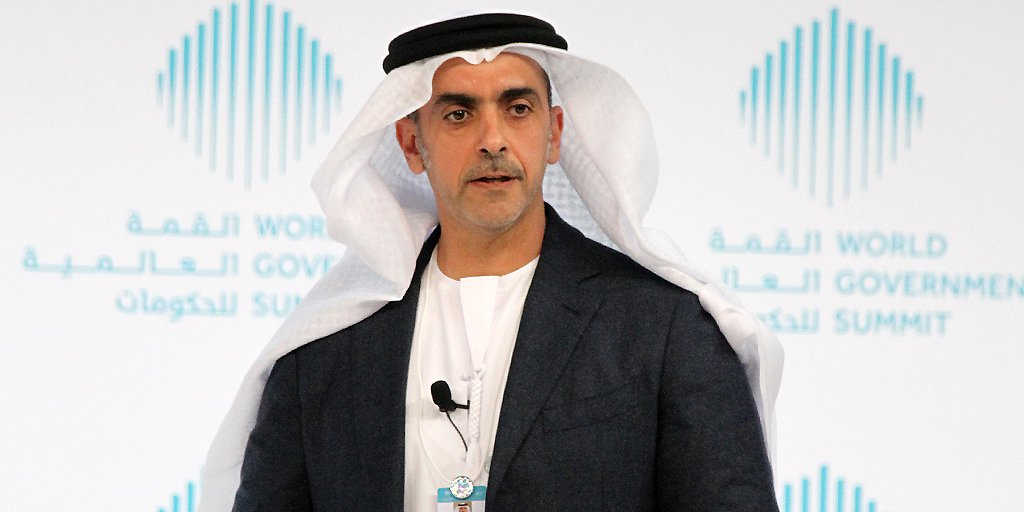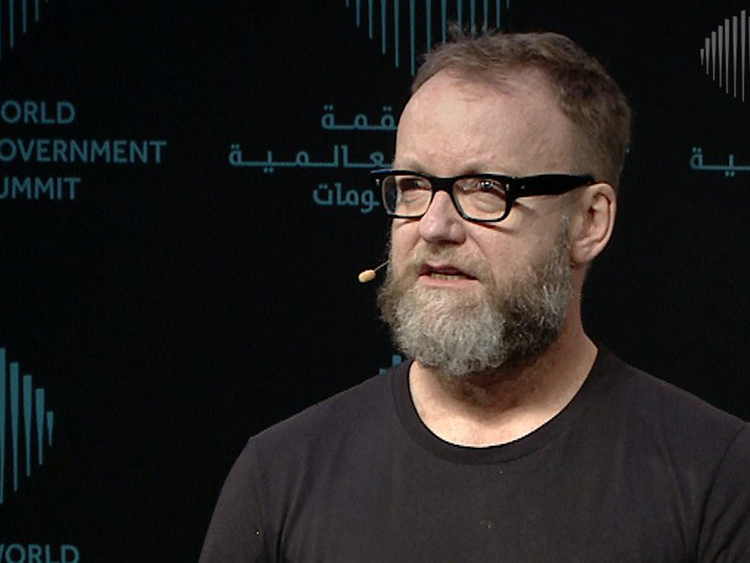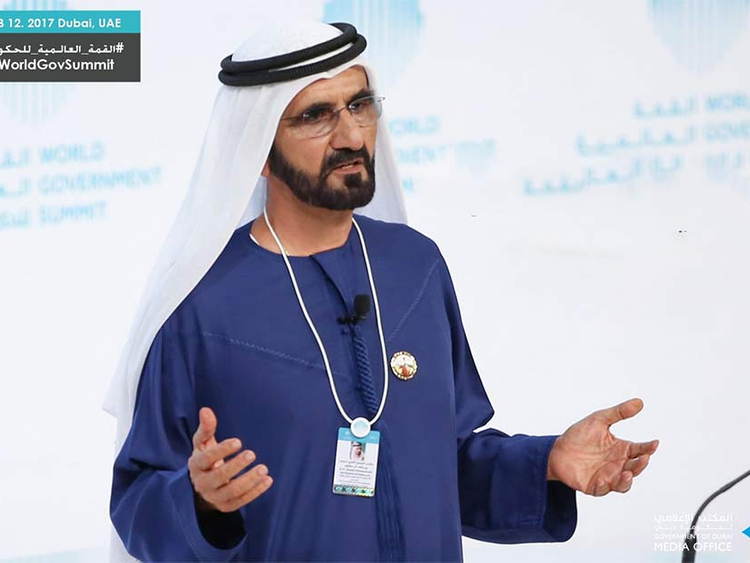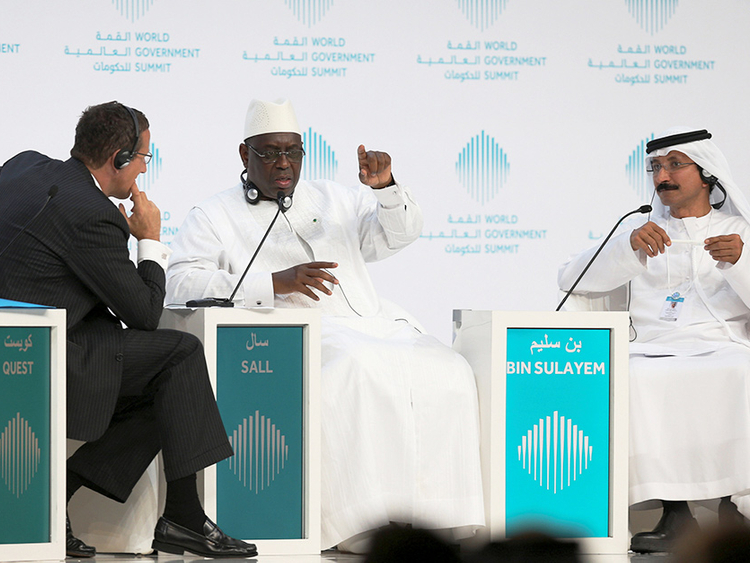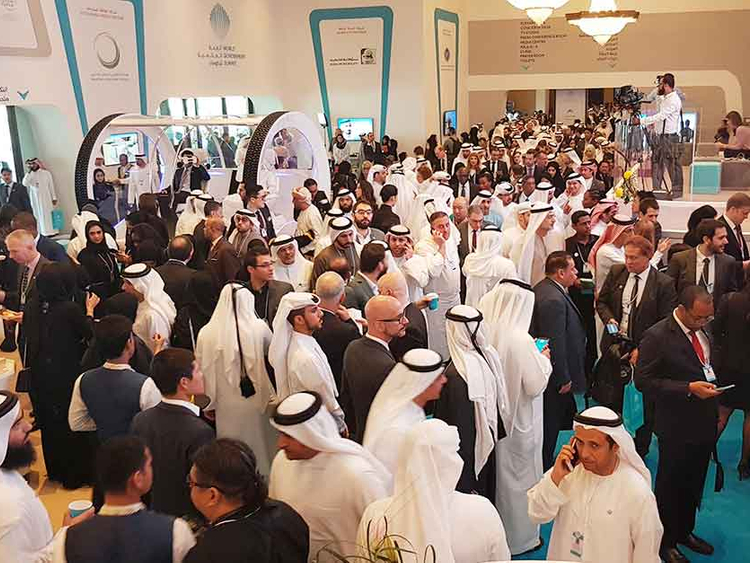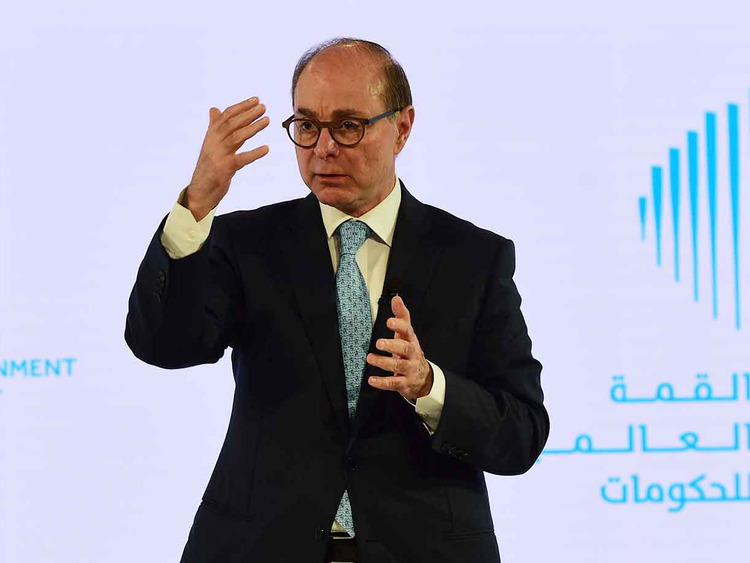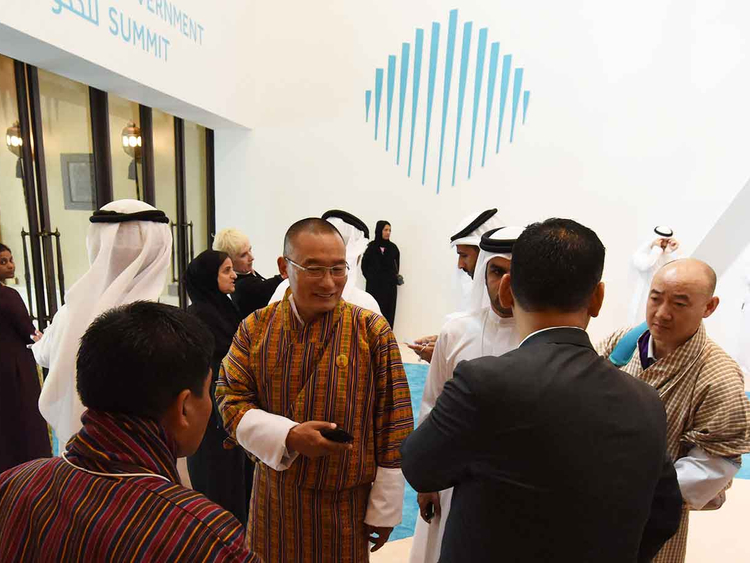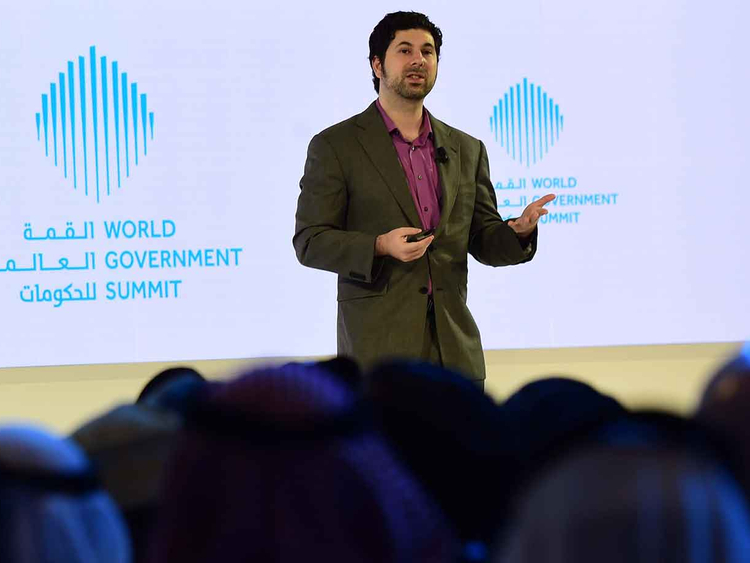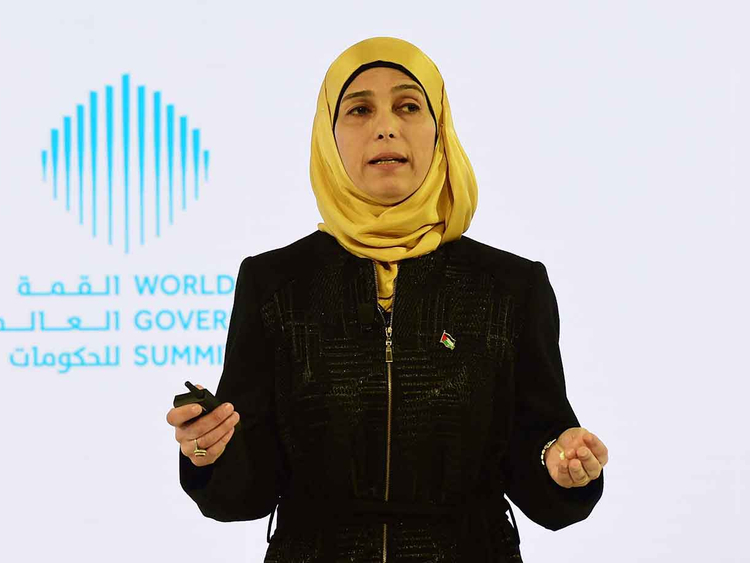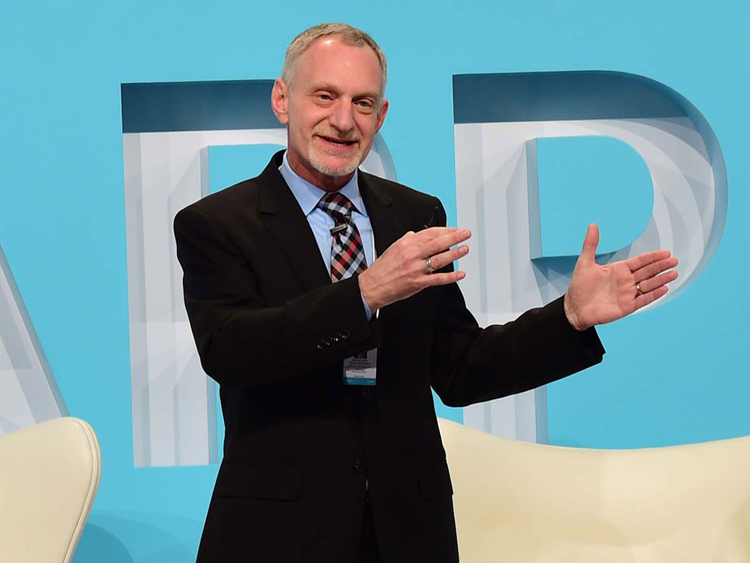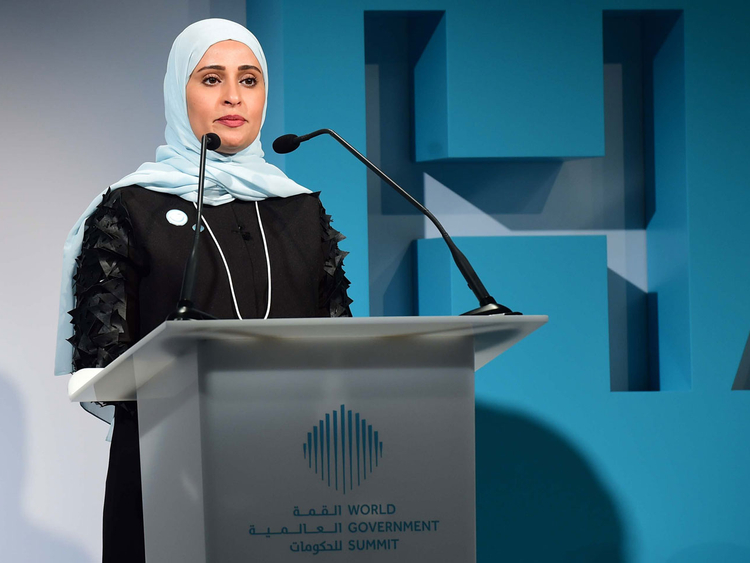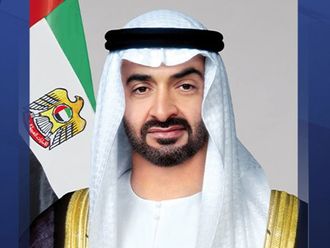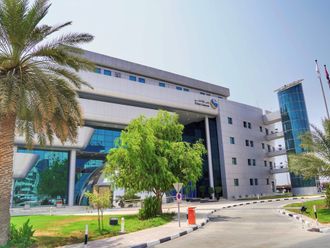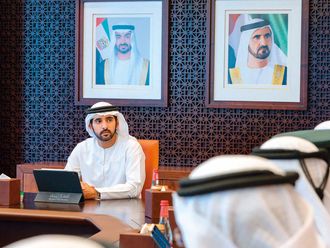The World Government Summit (WGS) 2017 started in Dubai on Sunday and concluded on Tuesday. Here's how the events unfolded.
Tuesday
4.00pm
Seven initiatives for Arab youth launched
By Jumana Khamis, Staff Reporter
Shaikh Mansour Bin Zayed Al Nahyan, Deputy Prime Minister and Minister of Presidential Affairs, announced seven initiatives as part of The National Arab Youth Strategy during the last session of the World Government Summit.
He took the stage, while surrounded by a group of young men and women who participated in the Arab Youth Forum, which took place on the side lines of the summit.
Before the participants shared their ideas, aspirations, and strategies for the future of the Arab World, Shaikh Mansour kicked off the session referring to a changing figure on the screen above him.
“You will see a number that is increasing by the second. This number is not the number of victims of war or the number of losses in the oil sector nor is it the figures fluctuating in the stock market or the number of terrorist attacks. This number refers to the increase in the most important wealth we have, which is the Arab youth,” he said.
Describing young Arabs as “an emblem of hope,” Shaikh Mansour pointed out that they are the largest demographic in the region, which makes them the “makers of the future.”
"The best approach to the youth strategy is to refer to the youth themselves," he said.
2.23pm
And the winners are...
The One-Stop-App: The Winner is the Mobile Government of Kazakhstan. https://t.co/jNPPclYew6 #WorldGovSummit
— World Gov Summit (@WorldGovSummit) February 14, 2017
Transport and Infrastructure Category: the Winner is Road and Transport Authority, Dubai, UAE @RTA_Dubai https://t.co/jNPPclYew6
— World Gov Summit (@WorldGovSummit) February 14, 2017
Trade & Economy Category: The winner is Vendors at Government from the Singapore Ministry of Finance https://t.co/jNPPclYew6 #WorldGovSummit
— World Gov Summit (@WorldGovSummit) February 14, 2017
Safety & Security Category: The winner is @DubaiPoliceHQ from the #UAE https://t.co/jNPPclYew6 #WorldGovSummit
— World Gov Summit (@WorldGovSummit) February 14, 2017
Environment Category: The winner is Easti Energia from Estonian Energy Company. https://t.co/jNPPclYew6 #WorldGovSummit
— World Gov Summit (@WorldGovSummit) February 14, 2017
Tourism Category: The winner is @VisitAbuDhabi by Abu Dhabi Tourism and Culture Authority, UAE. https://t.co/jNPPclYew6 #WorldGovSummit
— World Gov Summit (@WorldGovSummit) February 14, 2017
Social Affairs Category: The winner is #Germany. https://t.co/jNPPclYew6 #WorldGovSummit
— World Gov Summit (@WorldGovSummit) February 14, 2017
Health Category Winner: Guardians of Health by the Ministry of Health in Brazil. https://t.co/jNPPclYew6 #WorldGovSummit
— World Gov Summit (@WorldGovSummit) February 14, 2017
Education Category Winner: Learning Potential by the Australian Government of Education & Training. https://t.co/jNPPclYew6 #WorldGovSummit
— World Gov Summit (@WorldGovSummit) February 14, 2017
2.18pm
World Government Summit Awards Ceremony
Watch Live Now: #WorldGovSummit Awards Ceremony https://t.co/jNPPclYew6
— World Gov Summit (@WorldGovSummit) February 14, 2017
2.16pm
7 initiatives as part of National Arab Youth Strategy
HH Sheikh Mansour announces seven initiatives as part of The National Arab Youth Strategy. #WorldGovSummit
— World Gov Summit (@WorldGovSummit) February 14, 2017
The 1st initiative is a centre that works directly with Arab Youth; it will be led by them & their vision across the region. #WorldGovSummit
— World Gov Summit (@WorldGovSummit) February 14, 2017
The 2nd initiative involves the holding of the second Arab Youth Forum to provide young Arabs with a platform for dialogue. #WorldGovSummit
— World Gov Summit (@WorldGovSummit) February 14, 2017
The 3rd initiative is establishing a youth opportunity platform that allows them to benefit from capacity-building programs. #WorldGovSummit
— World Gov Summit (@WorldGovSummit) February 14, 2017
The 4th initiative will work on an annual Arab Youth Report that sheds light on young citizens’ dreams and aspirations. #WorldGovSummit
— World Gov Summit (@WorldGovSummit) February 14, 2017
The 5th initiative is a set of student exchange programs for Arab Youth to study at different universities around the world. #WorldGovSummit
— World Gov Summit (@WorldGovSummit) February 14, 2017
The 6th initiative is establishing youth circles held across the entire Arab World with the inclusion of 22 Arab countries. #WorldGovSummit
— World Gov Summit (@WorldGovSummit) February 14, 2017
The 7th initiative is a platform for Arab Youth to work on the economy and use crowdsourcing as a model for the future #WorldGovSummit
— World Gov Summit (@WorldGovSummit) February 14, 2017
2.08pm
Safety is key for nuclear plants, says IAEA head
By Derek Baldwin, Chief Reporter
Dubai: Spent radioactive nuclear rods expelled from the world's 440 nuclear power plants can be safely disposed of thanks to a new deep-earth geological facility that is expected to open in Finland in 2022, says the world's top nuclear official.
Radioactive waste will be buried deep within shields of rock where the plan is that it will be undisturbed for one million years to avoid human exposure.
In the UAE, the Western Region Barakah nuclear plant is on track for completion in 2020. With four reactors online, the facility will deliver up to a quarter of the UAE’s electricity needs and save up to 12 million tonnes in carbon emissions every year.
The first of the four reactors is expected to go online this year.
Yukiya Amano, Director of the International Atomic Energy Agency, told delegates Tuesday on the final day of the World Government Summit that contrary to some global public health concerns, burying high-level nuclear waste deep in the earth is a safe measure.
“It is difficult to deal witth higher levels of waste, spent fuel,” Amano said. “There is a way, geological disposal.”
Amano said in “Finland, a project is making very good progress. It's due to start operating in 2022.”
Spent rods with lower and medium levels of radioactive materials are easier to dispose of, he said.
There are 60 such nuclear reactors now under construction around the world with the help and guidance of IAEA, he said.
Amano said that the IAEA has been “working in close cooperation” with the UAE since the Barakah project started to ensure highest levels of safety and proper training.
Phillipe Jamet, Former Commissioner to the French Nuclear Safety Authority, told summit delegates that “there is a need for a huge investment in safety. I don't think a country can acquire nuclear without technical confidence.”
Revised UAE nuclear power safety measures prompted by the Japanese nuclear disaster five years ago will bolster the Western Region’s Barakah nuclear power plant’s capacity to withstand extreme events.
Stricter measures stem from a UAE review following the catastrophic failure of the Japanese Fukushima Daiichi nuclear power plant on March 11, 2011 when it was swamped by an earthquake-triggered tsunami.
Christer Viktorsson, Director-General of the UAE’s Federal Authority for Nuclear Regulation (FANR), said in an earlier interview that creating a safety culture in the UAE nuclear industry is paramount to avoid such a tragedy from being repeated here in the face of extreme natural disasters.
“A strong safety culture is critical to the success of nuclear energy in the UAE. At the FANR, we aim to instil values and behaviour that prioritise the protection of the UAE’s residents and environment above any competing interests,” said Viktorsson.
1.34pm
@HHShkMohd, in presence of @HamdanMohammed & Maktoum bin Mohammed, receives Executive Chairman of Cisco & Co-Founder of LinkedIn #Dubai
— Dubai Media Office (@DXBMediaOffice) February 14, 2017
1.31pm
Solar energy to power Dubai desalination plants
By Derek Baldwin, Chief Reporter
Dubai: Solar-powered reverse osmosis is set to reduce the expense of Dubai converting seawater into potable fresh water, said Saeed Al Tayer, Managing Director of Dubai Electricity and Water Authority on Tuesday.
Speaking at the fifth edition of the World Government Summit, Al Tayer said Dewa is working on powering its desalinated water plants with solar power to generate 305 million gallons per day by 2030.
By using lower cost renewable energy to power desal plants, Al Tayer said Dewa will save $13 billion between now and 2030.
Another major change in deslination for Dewa will be the addition of massive new underwater reservoirs that can store up to 50 million gallons of fresh water a day, he told delegates.
The underground cache of fresh water will greatly boost Dubai's longterm water security by puttting huge reserves away for a growing population.
The new reservoirs “will provide the emirate with a reserve of 5,100 million gallons for 75 days for the security of the emirate,” he said.
Al Tayer said the subterranean tanks won't affect taste or quality of the water.
Proper future planning by Dewa, will help future generations to “be capable of keeping pace witth the future,” Al Tayer said.
Thee solar power needed to power desalination will be provided primarily by the Shaikh Mohammad Solar facility in Dubai that is expected to eventually deliver 25 per cent of Dubai's total power with 5,000 MW of new electricity.
1.05pm
What makes Silicon Valley stand out?
Revealed: if a government official said I want to create a Silicon Valley in my country, what would they need to do? https://t.co/4Txzd3Ewz9
— World Gov Summit (@WorldGovSummit) February 14, 2017
DENSE NETWORK. Is the reason Silicon Valley stands out. Dense Network helps find talent, capital, expertise for scale-up. #WorldGovSummit pic.twitter.com/umc1PPY9FK
— World Gov Summit (@WorldGovSummit) February 14, 2017
TALENT: Government officials need to facilitate discovery and form a network of talent. Thats whats needed to create new Silicon Valleys. pic.twitter.com/Cos9SG1txu
— World Gov Summit (@WorldGovSummit) February 14, 2017
12.51pm
. @LinkedIn Exec Chairman @reidhoffman speaks about risks, entrepreneurship and startups at #WorldGovSummit pic.twitter.com/jM2tZHFQLP
— World Gov Summit (@WorldGovSummit) February 14, 2017
12.34pm
MUST READ: 40% of companies around the world will not exist in 10 years. Says John Chambers, watch now: https://t.co/4Txzd3Ewz9
— World Gov Summit (@WorldGovSummit) February 14, 2017
"The digitisation impact will have 3 to 5 X the economic and job opportunity of the internet today." John Chambers @Cisco pic.twitter.com/bcWnFK1cJ3
— World Gov Summit (@WorldGovSummit) February 14, 2017
12.31pm
Shaikh Mohammad takes closer look at flying pod
By Derek Baldwin, Chief Reporter
Dubai: His Highness Shaikh Mohammad Bin Rashid Al Maktoum, Vice-President and Prime Minister of the UAE and Ruler of Dubai, took a much closer look on Tuesday at the World Government Summit in Dubai of a new flying car to begin trials in Dubai in July.
Surrounded by security and an entourage, Shaikh Mohammad walked the outdoor grounds of the summit site at Madinat Jumeirah to examine the eight-propeller autonomous aerial vehicle (AAV) on display for 4,000 delegates at the summit to view.
Shaikh Mohammad was met by Mattar Al Tayer, Chairman of the Roads and Transportation Authority (RTA), and the two spoke for a few minutes.
On Monday, Al Tayer announced that the Chinese-produced aircraft drone dubbed EHANG184, can carry a single passenger for up to 30 minutes.
He said that passengers will simply climb into the pilotless vehicle, push preset destination buttons and the self-flying pod will deliver the rider to anywhere within Dubai.
The pod trials will be followed by driverless trials of other forms of public transport for which RTA has oversight including taxis, mini-buses, trams and boats.
Dubai's $6 billion Metro is already a proven, driverless form of public transport that carries 600,000 passengers a day across the Red and Green lines in the city.
12.18pm
Mohammad launches 10X initiative at World Government Summit
By Jumana Khamis, Staff Reporter
Shaikh Mohammad Bin Rashid Al Maktoun, launched a new initiative called '10X,' asking each Dubai government entity to think outside the box and come up with three initiatives yearly, that will place Dubai ahead of other cities.
He announced the initiative during a session at the World Government Summit, highlighting that Shaikh Hamdan Bin Mohammad Bin Rashid Al Maktoum, Dubai Crown Prince, and Shaikh Maktoum Bin Mohammad Bin Rashid Al Maktoum, Deputy Ruler of Dubai, will follow up with each government entity annually.
Shaikh Mohammad also announced that his latest book is in the printing process and will be available to the public soon.
"In my book, I talk about leadership and administration, as well as positivity and happiness. I hope it will benefit you all," he said to the audience.
11.52am
Shaikh Mohammad visits media centre at summit
By Derek Baldwin, Chief Reporter
Dubai: His Highness Shaikh Mohammad Bin Rashid Al Maktoum, Vice President and Prime Minister of the UAE and Ruler of Dubai visited the Media Centre on Tuesday morning, the final day of World Government Summit in Dubai.
During a brief visit, Shaikh Mohammad appeared to be in a good mood walking briskly, speaking to those in the room and at one point having a little fun with those taking pictures.
. @HHShkMohd inspects @RTA_Dubai’s Autonomous Aerial Vehicle at #WorldGovSummit
— Dubai Media Office (@DXBMediaOffice) February 14, 2017
Shaikh Mohammad visited the media centre last year as well prompting a flurry of picture taking by journos filing stories and pictures.
11.43am
Private sector key to Mena growth
By Derek Baldwin, Chief Reporter
Dubai: Private sector small and large businesses are the engine that will catapult the Middle East and North Africa towards greater future prosperity, said a leading global economist at World Government Summit on the last of the three day event in Dubai on Tuesday.
Sir Suma Chakrabarti, President of the European Bank for Reconstruction and Development (EBRD), lauded governments throughout the region for encouraging market growth but said they can only do so much.
The onus, he said, lies on private sector initiatives to meet challenges such as high youth unemployment to difficulties securing financing for projects.
Private sector growth, he said, is the main economic engine and lead creator of job growth.
Chakrabarti noted that 75 per cent of EBRD's investment in the region is within the private sector.
“We need ideas, entrepreneurs and bankable projects to invest in,” Chkrabarti told delegates in the main opening address of the summit.
Citing a new survey of 6,000 firms across the region by the EBRD, the European Investment Bank and World Bank, a series of challenges presented themselves for those conducting business operations.
“In some countries, they [respondents[ identified corruption as an impediment to their work. They try to avoid the government,” he said.
Political instability, unreliable electricity supply, lack of financing, a skills gap and excessive red tape that hinders expansion of trade were all duly noted in the survey report, he said.
“Unreliable supplies of electricity is a phenomenon that stifles productivity,” he said, adding that an ongoing regional skills gap “is turning out young people without the skills the market needs.”
The survey suggested that some Mena countries are placing too low of a priority on technical and vocational education and on-the-job training is difficult to secure.
The problems are not helping rein in unemployment in some countries such as Egypt where unemployment is topping 37 per cent.
Despite challenges, private sector agents are determined to succeed.
“In general, we can see private sector is acting as a catalyst for one of the greatest transformations of our time,” Chakrabarti said.
11.15am
What will be the Legacy of the 21st Century?
WOW: $168 billion will be saved with the deployment of autonomous driving technology! Says @matusjon at #WorldGovSummit pic.twitter.com/Z3RjMNex5T
— World Gov Summit (@WorldGovSummit) February 14, 2017
Legacy of the 21st century in collaboration with Popular Science Magazine. #WorldGovSummit @PopSci pic.twitter.com/uyuGwmmjiZ
— World Gov Summit (@WorldGovSummit) February 14, 2017
10.40am
'Happiness is the final common path of good policy'
Wise words by @MartinEPSeligma: What you believe about your life as a youth, you will carry for the rest of your life #WorldGovSummit
— World Gov Summit (@WorldGovSummit) February 14, 2017
"The people who never give up are the people who are optimistic, positive and have hope for the future." @MartinEPSeligma #WorldGovSummit
— World Gov Summit (@WorldGovSummit) February 14, 2017
10.17am
Power of being positive
Positively transform your life to succeed. Founder of Positive Psychology, @MartinEPSeligma explores this topic at the #WorldGovSummit pic.twitter.com/2TisHNlWDk
— World Gov Summit (@WorldGovSummit) February 14, 2017
Who's leading the curve on happiness? Martin Seligman says well-being can be a goal for the world and #Dubai is leading. #WorldGovSummit
— World Gov Summit (@WorldGovSummit) February 14, 2017
9.48am
The future of nuclear energy
Nuclear energy is a volatile topic today. H.E. Yukiya Amano & H.E. Philippe Jamet explore The Future of Nuclear Energy. #WorldGovSummit pic.twitter.com/km9X6Qtpqf
— World Gov Summit (@WorldGovSummit) February 14, 2017
"Climate change is one of the strongest reasons for using nuclear power." says @iaeaorg Director at #WorldGovSummit https://t.co/4Txzd3Ewz9
— World Gov Summit (@WorldGovSummit) February 14, 2017
"A gradual, transparent approach to nuclear energy is important to promote social acceptance." Yukiya Amano @iaeaorg at #WorldGovSummit pic.twitter.com/AcdEZ1IDDT
— World Gov Summit (@WorldGovSummit) February 14, 2017
“There will be a significant increase in the use of nuclear power by 2030.” IAEA Director Yukiya Amano #WorldGovSummit pic.twitter.com/BuMF54Z0Jw
— World Gov Summit (@WorldGovSummit) February 14, 2017
Will governments be able to maintain public acceptance for 100 years? Before embarking on nuclear energy investments. #WorldGovSummit pic.twitter.com/3c9VbkT3Zq
— World Gov Summit (@WorldGovSummit) February 14, 2017
9.32am
Reducing carbon emissions by 16% by 2021
"The Mohammed bin Rashid Al Maktoum Solar Park will be the largest solar park in the world" Saeed Al Tayer #WorldGovSummit @DEWA_Official pic.twitter.com/IHxGXZzYuV
— World Gov Summit (@WorldGovSummit) February 14, 2017
Saeed Al Tayer zeroes in on DEWA’s innovative electricity and water generation projects aiming to improve efficiency. #WorldGovSummit pic.twitter.com/EMqeXXqd7T
— World Gov Summit (@WorldGovSummit) February 14, 2017
"By 2050, Dubai will utilize 75% clean energy and become the city with the lowest carbon footprint in the world." Al Tayer #WorldGovSummit
— World Gov Summit (@WorldGovSummit) February 14, 2017
Saeed Al Tayer: "Our strategy is to reduce carbon emissions by 16% by 2021" #Dubai #WorldGovSummit https://t.co/R16viLYue4 pic.twitter.com/5lNCaviDGx
— Dubai Media Office (@DXBMediaOffice) February 14, 2017
9.20am
Shaping future governments
. @EBRD President @ebrdsuma "The state sector provides security to those who work in it, but rarely with the dynamism that is needed" pic.twitter.com/jkE1OcHooi
— World Gov Summit (@WorldGovSummit) February 14, 2017
"Private companies try to avoid government out of fear of corruption" @EBRD President at #WorldGovSummit https://t.co/Eqh3sYjTrl
— World Gov Summit (@WorldGovSummit) February 14, 2017
8.58am
Final day of #WorldGovSummit set to get under way
Today is the third and last day of #WorldGovsummit. Stay tuned to today's sessions pic.twitter.com/BTNa1j8hfb
— World Gov Summit (@WorldGovSummit) February 14, 2017
Monday
5.40pm
Shaikh Saif praises the values behind UAE development
"With the speed of UAE's development, we are not riding a fast train, we are riding an airplane," said Shaikh Saif Bin Zayed at the World Government Summit.
H.H. Sheikh Saif Bin Zayed attests the values of the UAE. #WorldGovSummit pic.twitter.com/W7fZPau90f— World Gov Summit (@WorldGovSummit) February 13, 2017
Countries are like human beings, if they do not have immunity, viruses and diseases will take over and kill them. We do not stop in the face of adversity, he said.
Shaikh Saif Bin Zayed praised the countries that prioritise ethics and integrate them into everything they do at the World Government Summit.
5.06pm
Shaikh Saif Bin Zayed: On Nations' Sustainability
.@SaifBZayed addresses the #WorldGovSummit on Nation's Sustainability pic.twitter.com/QgafDcMaNW— Dubai Media Office (@DXBMediaOffice) February 13, 2017
4.32pm
RTA announces test of first manned drone in Dubai.
4.05pm
His Highness Shaikh Mohamamd Bin Rashid, Vice President and UAE Prime Minister and Ruler of Dubai, meets Elon Musk, CEO of electric carmaker Tesla.
3.27pm
'Dubai will be a pioneer in driverless transportation by 2030'
"Dubai will be a pioneer in driverless transportation by 2030." H.E Matar Al Tayer #WorldGovSummit https://t.co/BifztSfiEs
— World Gov Summit (@WorldGovSummit) February 13, 2017
1.45pm
Food revolution needed to fight waste, climate change
By Derek Baldwin, Chief Reporter
Dubai: A global food revolution is needed to stem looming food shortages, food waste and worsening climate change in years to come, said senior global experts in a panel discussion at World Government Summit on Monday.
But governments can't do it alone -- individuals can achieve food security through a conscious effort to conserve food from waste and help the environment.
The panel is part of the first Climate Action forum by the UAE Ministry of Climate Change and Environment to be held every year at World Government Summit.
Dr Thani Al Zeyoudi, UAE Minister of Climate Change and Environment, said the world wastes $2.6 trillion worth of food every year at a time when farmers are leaving rural areas for the cities.
The issue is of concern in the UAE as well, he said, when combined with global fears of growing food security and waste.
“It is a $4 billion [a year] problem in the UAE,” Al Zeyoudi said. “We need food efficiency.”
Greater use of new agri-technology, he said, can increase “food efficiencyy for production that will produce food with 99 per cent less water.”
Greater care is needed from the farmer's field to kitchen table if the world is to sustain growing food demand that will spike by 50 per cent by 2050, Al Zeyoudi said.
Jose Graziano Da Silva, Director-General of the United Nations Food and Agriculture Organisation (FAO), said the food security issue is compounded heavily by the atromical amount of food wasted daily around the world.
“We need to waste less food, one-third of food we produce is wasted,” Da Silva told delegates in the Monday morning session.
Da Silva said entirely new approaches are needed for the global food system to help fight climate change.
”We need to transport less food over distances,” he said, “to reduce greenhouse gases from food transport.”
Patricia Espinosa, Executive Secretary of the United Nations Framework Convention on Climate Change, said the recent Paris Agreement adopted in December 2015 now has been ratified by 129 countries as a blueprint for decades to come to hold global temperatures to less than 2 degrees Celsius.
Fighting climate change may help limit the massive impacts upon agriculture that disruptive weather patterns and storms could bring down the road, she said.
“There is a need for us to accelerate action in order for us to build agriculture,' Espinosa said. “Food waste is something that starts with the individual and his activities.”
Tshering Tobgay, Prime Minister of the Kingdom of Bhutan, said food security is critical in his country where 64 per cent of citizens depend on agricultural for a living.
Fighting climate change in years ahead is critical to stop changes already happening in his country, he said.
Tobgay said that “because of climate change, glacial lakes are breaking dams and wreaking havoc downstream.”
1.34pm
Mohammad honours Mariam Rashid Al Ziyoudi the Most Innovative Teacher Award
Mariam Rashid Al Ziyoudi, was announced as the winner of the Emirates Innovative Teachers Award- worth Dh1 million, during the second day of the World Government Summit.
The Emirati teacher from Al Massa High school in Dubai, was awarded by His Highness Shaikh Mohammad Bin Rashid Al Maktoum, Prime Minister of the UAE, and Ruler of Dubai.
@HHShkMohd honors Mariam Al Zeyoudi, winner of Emirates Innovative Teachers Award #WorldGovSummit pic.twitter.com/wj9A1CfITA
— Dubai Media Office (@DXBMediaOffice) February 13, 2017
The award strives to adopt the most effective steps to support the education sector that complements the national strategy of 2021.
Hussain Ebrahim Al Hammadi, Minister of Education,and Sunny Verkey, Founder and group chairman of Gems education were also among the attendees.
12.50pm
Mohammad attends World Government Summit Day 2
Pics: @HHShkMohd, accompanied by @HamdanMohammed & Maktoum bin Mohammed, attends main address by UN Secretary General at #WorldGovSummit pic.twitter.com/RTMhvg5B0f
— Dubai Media Office (@DXBMediaOffice) February 13, 2017
12.01pm
Five ways to fight radicalism...
Thought provoking opinions shared by Paul Bennet, his story of '31 years of being increasingly curious'! @pbennett101 pic.twitter.com/5kDGRgVshj
— World Gov Summit (@WorldGovSummit) February 13, 2017
Bennett shares an inspiring story from a young ambitious girl in Rwanda #WorldGovSummit pic.twitter.com/LJIb73fuIH
— World Gov Summit (@WorldGovSummit) February 13, 2017
11.16am
'UAE is Muslim society with huge diversity; we can use it as an example of success'
Sheikha Lubna: "Islam is being hijacked" watch her live now: https://t.co/rQFeNRAj8S #WorldGovtSummit
— World Gov Summit (@WorldGovSummit) February 13, 2017
Earlier today: Sheikha Lubna with @JDefteriosCNN "I think we take values of tolerance for granted" #WorldGovSummit pic.twitter.com/r3ww8RKcrk
— World Gov Summit (@WorldGovSummit) February 13, 2017
11.01am
Renewed UN focus can reduce conflicts, says UNDP head
By Derek Baldwin, Chief Reporter
Dubai: The United Nations has come a long way since its founding in October 1945 after the Second World War to prevent further major global conflicts, said Helen Clark, Administrator of the United Nations Development Program (UNDP) on day two of the World Government Summit in Dubai.
But a lot of work remains as a flurry of new regional conflicts continue to rage around the world, she told delegates in the opening address at Madinat Jumeirah.
To address conflicts and other pressing global issues such as sustainable development, Clark said the UN needs continued maintenance to be relevant and meet urgent calls for action.
The UN began as a 51-member country organisation tasked with global peace and security and today has grown to 193 members.
2nd day of #WorldGovSummit kicks off with a keynote speech by Administrator of UN Development Programme Helen Clark pic.twitter.com/pZtJLlyenH
— Dubai Media Office (@DXBMediaOffice) February 13, 2017
“My own independent view is that it isn't broken, but it does need to be refreshed ... focus should be on what needs fixing,” Clark told delegates attending the fifth edition of the summit which has attracted 4,000 delegates and 150 speakers from 139 countries.
“When I came to the UNDP in 2009, I was told numbers of armed conflicts were down,” she said. “From 2011, we have seen a spike in the numbers of deadly conflicts.”
Clark said finding a solution to “dangerous waves of violence, fuelled by terrrorism”, for the UN and its Security Council has not been easy and is a work in a progress as conflicts such as Syria and Sub Saharan Africa continue to resist international attempts for remediation.
“I think that providing peace and security is at the core of the UN's mission, it's important to find what is driving the spike in conflicts,” Clark said, “but it's hard to achieve.”
One of the keys to dismantling and preventing conflicts, she said, is through development that helps communities.
“Our 2030 agenda building asserts that there can be no development without peace, and no peace without development,” Clark said.
10.49am
How will the role of government be altered in next 100 years
How will the role of governments be altered in the next 100 years? Dr. George Friedman predicts various scenarios at the #WorldGovSummit. pic.twitter.com/qLzYebQJyr
— World Gov Summit (@WorldGovSummit) February 13, 2017
10.15am
What is the impact of climate change on food security?
H.E. Tshering Tobagy addresses a global audience at #WorldGovSummit to discuss climate change and its impact on food security. pic.twitter.com/nP6uZ46sn7
— World Gov Summit (@WorldGovSummit) February 13, 2017
Tshering Tobgay, Prime Minister of Bhutan speaks at the summit
10.00am
'Innovation Belongs to Our Youth'
Child Prodigy Thomas Suarez shares his experience in the world of innovation at the #WorldGovSummit. pic.twitter.com/RdaTOHidBw
— World Gov Summit (@WorldGovSummit) February 13, 2017
9.57am
Fatima Al Kaabi shares her rise to fame
Up and coming innovator Fatima Al Kaabi shares her rise to fame at the #WorldSummit. pic.twitter.com/TA30YMJKLv
— World Gov Summit (@WorldGovSummit) February 13, 2017
9.48am
'Spike in number of deadly conflicts since 2011'
"From around 2011, we have seen a spike in the numbers of deadly conflicts." @HelenClarkUNDP at #WorldGovSummit https://t.co/GBnSWe3nBN pic.twitter.com/ekPCeAKPK2
— World Gov Summit (@WorldGovSummit) February 13, 2017
9.12am
يوم جديد ومواضيع جديدة ستبدأ بعد قليل. تابعونا.
#القمة_العالمية_للحكومات pic.twitter.com/QLar3BFruL— World Gov Summit (@WorldGovSummit) February 13, 2017
7.31am
Ministry organises dinner sourced from surplus food
Dubai: The UAE Ministry of Climate Change and Environment organised a first-of-its-kind gala dinner at the World Government Summit 2017 with a twist late Sunday.
The dinner was hosted in honor of dignitaries attending the Forum for Climate Change and Food Security, one of three forums being held at the World Government Summit 2017 until Tuesday in Dubai..
Guests consciously participated in the meal that was sourced entirely from surplus food. In doing so, the guests also demonstrated support for the Food Bank initiative launched by His Highness Shaikh Mohammad Bin Rashid Al Maktoum, Vice President and Prime Minister of the UAE and Ruler of Dubai, in January 2017.
Dr Thani Ahmed Al Zeyoudi, Minister of Climate Change and Environment, said: “The ministry deeply appreciates the wholehearted support of its guests in sending out this impactful message that breaks with convention and visibly demonstrates their support for governments’ commitment to reverse trends of food waste.”
Quoting data published by the World Bank, Dr Al Zeyoudi said that the food security is an immense challenge looming large for world governments, as they will need to plan to produce at least 50 per cent more food to feed a projected nine billion people by 2050. He added that climate change could cut crop yields by more than 25 per cent making their objective even harder to achieve. Other challenges in the mix include depletion of land, biodiversity, oceans, forests, and different forms of natural capital at unprecedented rates.
"For governments to answer this composite challenge, they must foster social behavior where responsible food consumption is the norm. This will go some way in saving the 1.3 billion tons of food that are being wasted every year, which represents a staggering 3o per cent of the world's food produce.”
He added: "In the UAE alone, food worth AED13 billion is wasted annually."
The UAE Food Bank was launched in January 2017 as part of the UAE’s Year of Giving initiative in 2017.
Dubai is aiming to become the first city in the region to achieve zero food waste.
7.24am
Day two of WGS hosts array of global leaders
By Derek Baldwin, Chief Reporter
Dubai: An impressive array of some of the world's top political, business, and scientific minds will gather on Monday for the second day of the World Government Summit in Dubai.
As many as 4,000 delegates and 150 speakers from 139 countries are attending the fifth edition of the annual platform at Madinat Jumeirah dedicated to shaping future governments through 114 sessions.
Shaikh Saif bin Zayed, Deputy Prime Minister and Minister of Interior, will deliver an address on the nation.
Helen Clark, Administrator of the United Nations Development Programme (UNDP) will open day two in a main address to delegates.
Antonio Guterres, Secretary-General of the United Nations, will deliver an afternoon main address followed by Jim Yong Kim, President of the World Bank.
Irene Bokova, Director General of the UNESCO, will address delegates on building resilient societies through education and innovation.
Ahmad Bin Byatt, Chairman of Emirates Integrated Telecommunications Company, will lead a panel discussion on innovation and youth with innovators Ralph Suarez and Fatima Kaabi.
In a following session in the morning, environmental experts will ask “What is the impact of climate change on food security?
Dr Thani Al Zeyoudi, UAE Minister of Climate Change and Environment, will be joined by Jose Graziano Da Silva, Director-General of the United Nations Food and Agricultural Organisation and Tshering Tobgay, Prime Minister of the Kingdom of Bhutan for the climate discussion.
A discussion entitled "Transcending borders of culture, race and religion" will feature speakers Shaikha Lubna, Minister of Tolerance in the UAE and Omar Saif Ghubash, UAE Ambassador to Russia.
Sunday
5.30pm
Shaikh Mohammad at World Government Summit
Economic openness is a ground reality, and we, as Arabs, should not lean towards economic isolation as the global market is open, said His Highness Shaikh Mohammad Bin Rashid Al Maktoum, Vice-President and Prime Minister of the UAE and Ruler of Dubai.
Speaking during the WGS, Shaikh Mohammad said: “We are living in a common global market, and instead of inter-Arab openness and the common Arab market, we should aspire for international openness.”
“We should not lose hope that we can achieve Arab progress and development, despite challenges and problems surrounding us. The GCC’s achievements over the past four years are equal to achievements made by the GCC over the past 40 years, he added.
“Success is not measured by the size of a population nor by the modernity of countries or oil resources, but by will and management. The GCC under the leadership of Saudi Arabia’s King Salman Bin Abdul Aziz, will have a major role and positive impact on the Arab level,” he added.
.@HHShkMohd: Our key achievement is our people; when the #UAE was founded in 1971 we had 40 graduates, today we have 77 universities pic.twitter.com/cC0JQixJJ3— Dubai Media Office (@DXBMediaOffice) February 12, 2017
“The UAE’s policy is based on placing the interests of its people over any other considerations. The previous US administration committed a series of mistakes, such as the invasion of Iraq and supporting revolutions,” he said.
“The UAE, like any other country, was subjected to plots, however this never prevented us from working hard and accomplishing achievements. I believe that there are conspiracies targeting countries, and this has existed for thousands of years. Each country works for their own interests, but this will not stop us,” Shaikh Mohammad added.
“Mankind creates civilisations, and the Arab people have the cultural fundamentals to rise again,” he added.
“We have those who kill others in the name of the Holy Quran, and they blow themselves up in the Arab, Europe and the US. But they have nothing to do with Islam, which is innocent and a religion of tolerance. Prior to Islam, tribes were fighting and invading each other. With the advent of Islam, a great civilisation was built, one that benefitted the entire world.”
5.15pm
Shaikh Mohammad at World Government Summit: "UAE's policy is to put the interest of the people above all else and former US Government committed a series of mistakes like invading Iraq and to support revolutions."
Shaikh Mohammad at World Government Summit: "Gulf Cooperation Council led by King Salman will be a big and positive impact on the Arab countries."
5.00pm
Shaikh Mohammad at World Government Summit: "We don't claim perfection but we learn every day and we don't have to forfeit time and must work, achieve our goals, and make our experience available to everyone."
4.55pm
Shaikh Mohammad at World Government Summit: "The problems of the world will not stop, but we must focus on growth and strive in the service of our country and achieve comprehensive development."
"We shouldn't lose hope in achieving progress and development despite Arab problems and challenges surrounding us."
4.42pm
Shaikh Mohammad Bin Rashid to address the World Government Summit on How to Reignite the Region's Development.
4.32pm
'UAE an oasis of tolerance‘ says Japanese PM Shinzo Abe.
"I would like to express my deep appreciation for the UAE as an oasis for tolerance" Japan Prime Minister @AbeShinzo #WorldGovSummit— World Gov Summit (@WorldGovSummit) February 12, 2017
4.24pm
Stay tuned for our live coverage of @HHShkMohd's session at the #WorldGovSummit— Dubai Media Office (@DXBMediaOffice) February 12, 2017
3.14pm
US economy to grow in 2017, says IMF chief
The head of the International Monetary Fund (IMF) told delegates at the World Government Summit on Sunday that 2017 forecasts of a strong US economy are a good thing despite very real fears of a negative knock-on effect for the international business community.
French politician Christine Lagarde, Managing Director of IMF, said a raft of new sweeping new financial directives by President Donald Trump will result in domestic economical growth.
“It is likely there will be a tax reform, it is likely there will be investment in infrastructure,” Lagarde said. “ It is likely that growth will be up in the US. It's very likely the US economy will fare better, that's the good news.'
However, Lagarde also acknowledged that an infrastructure boom “will have consequences in the rest of the world. We are likely to see higher interest rates from the Fed".
Lagarde made the remarks in a discussion in the plenary hall of the summit hosted by CNN Presenter Richard Quest.
Lagarde acknowledge main street middle class people around the world are worried about Trump's election, Brexit, and rising populism and “are losing confidence”.
Lagarde said governments in general have not caught up with the aggravation of people who have been left behind as technology and globalisation rapidly transform economic landscapes.
Governments were also caught unaware with the rise of anger by electorates across the west in Europe and America.
“It was insidious, it came slowly over time,” she said. “It's been accelerating recently.”
Asked if she was aware of mounting discussion about taxation coming to the Middle East such as the the VAT tax coming into effect January 1, 2018 in the UAE, Lagarde said “most people in the world do [pay taxes], so get used to it. You need public investment, you need public funding. As a result, there to be a degree of taxation.”
Mari Kiviniemi, Deputy Secretariat of the Organisation fo Economic Cooperation and Development, agreed in her address to the summit with that governments must now do more to build trust with their people.
After a terrible 2016, she noted that governments need to “better restore trust with the public.”
Free trade needs protection: Senegal President
By Derek Baldwin, Chief Reporter
Senegal President Macky Sall said his country is forging ahead with free trade efforts and globalisation in the face of a possible global economic slowdown and protectionist policies from some quarters.
Sall was responding to perceived fears of speculative American and European protectionism that could have a serious knock-on effect on world markets if entered into force in the coming year and ahead.
In a panel discussion at Sunday's opening of Dubai's three-day World Government Summit, Sall said his country depends on the flow of free trade to keep its economy vibrant.
“We can't ourselves off from all these flows,” said Sall. “Globalisation needs to take into acccount nationalism. I think we have to improve on this model of free trade. We have to vigilant, we have to protect it.”
Sall said he wants “African goods to be transported to US without tariffs or taxes", adding that “everyone has to agree on the foreign goods that enter your country”.
Sultan Bin Sulayem, Chairman of DP World, which has port operations in Senegal, shared Sall's views on the panel and said that he believed “the anti-global sentiment will effect our business”.
Sulayem said that Trump is “about fair trade, not free trade ... if America is open, they expect other markets to be open, which is fair”.
He pointed out that “75 per cent of business that we see is from emerging countries”.
2.52pm
Are you a genius in the making?
Author @RobinSharma reveals that thanks to neuroplasticity, we are all geniuses in the making. #WorldGovSummit pic.twitter.com/lWyx1wlj21
— World Gov Summit (@WorldGovSummit) February 12, 2017
2.15pm
"One of your game changing advantages is: outlearn everyone around you." @RobinSharma #WorldGovSummit
— World Gov Summit (@WorldGovSummit) February 12, 2017
1.12pm
Shaikh Mohammad presents Best Minister Award
The award has gone to Awa Marie Coll-Seck, Senegal's minister of health and social interaction.
Awa Marie Coll-Seck, Senegal Minister of Health & Social Interaction, wins the Best Minister Award. #WorldGovSummit
— World Gov Summit (@WorldGovSummit) February 12, 2017
12.39pm
Shaikh Mohammad Bin Rashid arrives at the summit
His Highness Shaikh Mohammad Bin Rashid Al Maktoum, Vice-President and Prime Minister of the UAE and Ruler of Dubai, has arrived at the World Government Summit.
12.37pm
"The university has to come to you, you don't have to come to the university." @PresidentAoun at #WorldGovSummit pic.twitter.com/ZhyZ9v2tz5
— World Gov Summit (@WorldGovSummit) February 12, 2017
11.54am
President and Founder of Delphi Group, @TKspeaks, talking about Gen Z: They're coming and they'll disrupt governments #WorldGovSummit pic.twitter.com/Nz6vCBfpaf
— World Gov Summit (@WorldGovSummit) February 12, 2017
11.38am
Watch: Dr. Brian Greene, Co-Founder and Executive Chairman of The World Science Festival, speaks at the summit
UAE leaders praised for foresight
By Derek Baldwin, Chief Reporter
Dubai: The fifth edition of the World Government Summit in Dubai is now a critical addition to the world conversation on how best to meet an uncertain future, said one of the world's senior global political visionaries at the summit opening on Sunday.
Professor Klauss Schwab, Founder and Executive Chairman of the World Economic Forum, extolled UAE leaders in the main address for having the foresight to begin the global discussion on shaping future governments.
The three-day summit, Schwab said, “has become a meeting or worldwide importance ... we are at an historical crossroads.”
World leaders are among 4,000 delegates in Dubai from 139 countries to hear 150 expert speakers in 114 sessions share their thoughts on reshaping governments in a time of great political upheaval and technological change.
Schwab noted that recent populism movements have created a backlash against the culture of neo-liberalism and globalism forcing governments to rethink how they approach their citizenry in a “world that is characterised by fragility and hostility”.
Schwab said as the world moves from a single single power political structure to a multi-power one, an “anti-system movement” is rebelling against traditional governments.
“Happiness and well-being, I think, should be at the centre of our policies,” Schwab said. “We can look at this revolution as an opportunity. That's why I like to come to Dubai; because it still looks to the future with great optimism.”
Schwab said that the key for governments to finding a balance between a new domestic happiness and meeting an increasingly globalised world is merging both into unified policies.
Governments must “learn to integrate a national and a global identity ... we have to find a way to harmonise these”.
He suggested to delegates that several key elements in future goverment strategies are critical to countering the tide of change.
Schwab suggested the way forward to respect human dignity and diversity; serve communities and act as stewards for our children and tomorrow's generations.
Watch: Professor Klaus Schwab talks at the summit
Mohammad Bin Abdullah Al Gergawi, Minister of Cabinet Affairs and the Future Chairman of the WGS organisation, opened the summit early on Sunday.
“Taking risks for the future isn't our main objective. We are here to find the next challenges, the next opportunities,” Al Gergawi said in his address.
“In the coming few days, we will try to find out how technology will be reshaping governments and next generations will deal with those challenges,” he said.
Dr Brian Greene, co-founder and chairman of the World Science Festival, gave delegates a quick lesson in science history and how the discover of things such as gravity have helped shaped goverments up until today.
He encouraged governments to think beyond the normal to support new discoveries awaiting human curiosity.
“That's the kind of innovation and progress that so many of us hold dear,” he said.
11.26am
'Corporations must lead the way'
Dr. Greene believes that big corporations should lead the way for a new global conversation among governments. #WorldGovSummit
— World Gov Summit (@WorldGovSummit) February 12, 2017
10.53am
"This is just a stage of the shifting of events; an attempt to try to find solutions." #WorldGovSummit pic.twitter.com/c0kiKAc7PC
— World Gov Summit (@WorldGovSummit) February 12, 2017
10.23am
The urge to explore
Dr. Brian Greene: "This urge to explore is utterly basic to human nature. To many, it surfaces before we even learn languages." @BGreene pic.twitter.com/7j7clrnmoK
— World Gov Summit (@WorldGovSummit) February 12, 2017
10.10am
Science and governance
Now: a session on “How Advanced Science is Shaping the Future of Governments” by Brian Greene #WorldGovSummit pic.twitter.com/jMAtsrIJN0
— Dubai Media Office (@DXBMediaOffice) February 12, 2017
9.32am
Globalism under the spotlight
Professor Klaus Schwab is delivering a speech.
Now: Professor Klaus Schwab, Founder & Executive Chairman of @WEF, speak on the Challenges of Globalism #WorldGovSummit pic.twitter.com/zvQuY1cZoe
— Dubai Media Office (@DXBMediaOffice) February 12, 2017
9.29am
Minister Al Mohammad Al Gergawi delivers speech
Mohammad Bin Abdullah Al Gergawi, Minister of Cabinet Affairs and the Future and Chairman of the WGS Organisation, delivers a speech.
#WorldGovSummit kicks off with a speech for Mohammed Al Gergawi pic.twitter.com/zxs0e2v1os
— Dubai Media Office (@DXBMediaOffice) February 12, 2017
Mohammed Al Gergawi: #WorldGovSummit aims to determine what will change the world during the next 10 years
— Dubai Media Office (@DXBMediaOffice) February 12, 2017
8.01am
World Government Summit kicks off
By Derek Baldwin, Chief Reporter
World leaders are in Dubai to attend the kick-off Sunday morning of the three-day World Government Summit.
As many as 4,000 delegates and 150 speakers from 139 countries are attending.
The fifth edition of the summit (WGS 2017), say organisers, is the world’s largest platform for shaping future governments with 114 sessions “making it the largest participation of its kind since the event was first launched in 2013”.
Global luminaries across political, scientific and futurist lines will address the summit, said organisers.
Saturday
The World Government Summit (WGS) 2017 kicks off in Dubai on Sunday, and is hosting the Global Happiness Dialogue on Saturday. As it happened:
1.11pm
Harvard study says close relationships key to happiness
By Derek Baldwin, Chief Reporter
Dubai: Fortune and fame will never make us happy, suggests the findings of a Harvard University Medical School study 75 years in the making.
Close relations are the key to being truly content and safely shielded from the miseries of a cold world, it would seem, posit decades of medical study at one of America's top schools.
Professor Dr Robert Waldinger, Director of the Harvard Study of Adult Development, told hundreds gathered for the first Global Dialogue on Happiness on Saturday the secret to happiness appears to lie within your loved ones.
Those who do not have the support of a close-knit community may find attaining happiness difficult.
“Close relationships are the strongest indicators of what would keep people health and happy throughout their lives,” Dr Waldinger said at the conference ahead of Sunday's launch of the three-day World Government Summit in Dubai.
In the life-long study of Harvard male students and underprivileged boys from Boston in parallel right through until today, the study shows that subjects who have meaningful connections with relatives, friends and colleagues fared better throughout life.
“Those with happier relationships, stayed healthier,” said Dr Waldinger, adding those who are surrounded by loved ones are “less likely to develop cognitive decline".
With US statistics reporting that one in five people say they are lonely, it is that isolation that is contributing to less happiness and early death, he said.
“Loneliness turns out to be toxic not only for happiness but also for health,” he said.
Relationships do not have to be perfect, he said, just based on mutual trust and confidence in one another to make us feel connected to the world around us.
“One of the things that we found is that relationships don't have to be smooth,” said Dr Waldinger. “People need someone who they believe they can count on when things get hard.”
He joked that if aliens visited earth and their first exposure to humans was through Facebook, the skewed profiles of millions of people showing faux happiness would lead to a distorted view of people on earth.
Aliens “would believe that we were all either all on vacation or at a party all of the time,” he said.
Happiness he said is not “what we see on billboards or on our Twitter feeds.”
11.10am
‘Governments must aim for happy citizens’
By Derek Baldwin, Chief Reporter
Dubai: A government’s prime mission is ensuring that its people are happy across all walks of life, said world leaders on Saturday at the first Global Dialogue on Happiness in Dubai.
The conference was held ahead of the three-day World Government Summit in Dubai, beginning Sunday, and which is hosting 4,000 delegates and 150 speakers from 139 countries around the world.
Ohoud Al Roumi, UAE Minister of State for Happiness, opened the conference, which she called a first of its kind to create a world platform to build happiness into the international conversation about global development.
“The question that should be asked today is: Will this contribute to a more happier life?” Al Roumi told a standing-room only audience, noting that studies show that “people who are lonely suffer an early death”.
Al Roumi said the UAE is championing happiness for its people to counter global statistics that suggest 350 million people suffer from depression ad that “18,000 people die every day from depression between the ages of 18 and 29”.
The World Health Organisation, she said, predicts that depresssion “will be one three main diseases by 2030”.
Al Roumi said that the key challenge for governments is to balance economic growth with well being to stave off deepening depression.
“Governments should assume responsibility in order to improve the living conditions for its people,” Al Roumi said. “We, in the United Arab Emirates, believe that the main duty of the government is to promote happiness.”
In opening remarks, Helen Clark, Administrator of the United Nations Development Programme, told the conference that world governments are listening and are moving to incorporate “alternative measures of well being” into national indicators that measure progress.
Clark lauded the UAE for its happiness goals noting that a recent study showed “18 per cent of adults experienced a mental disorder. More needs to be done for those who are living with mental illness.”
Self determination of citizens is a big factor in happiness, she said.
“The freeedom to make one’s own choices has been identified as a means of advancing happiness,” Clark said, adding that “paying more attention to happiness should be a component to our efforts to sustain human development.”
In his keynote address, Bhutan Prime Minister Tshering Tobgay shared with the conference that his country has been making happiness a prime directive at top government levels for the last four decades. much to the spiritual prosperity of its people.
Flanked by pictures of grinning citizens of Bhutan, Tobgay quipped that after a very diffficult 2016 for everyone, it was a good time to focus on being happy.
He was candid in his remarks that some governments around the world are missing the mark when it comes to their citizenry.
“The simple fact is that governments have not taken the happiness of their people seriously enough,” Tobgay said.
His country is so serious about happiness, it created what it calls Gross National Happiness as an official indicator of its own development, he said.
“GNH drives all development in Bhutan,” Tobgay said, adding that happiness is measured by a GNH Commission which looks at everything from social equity, environment and good governance before recommending government policies for approval.
“We politicians can’t be trusted, we can easily be distracted,” Tobgay said, drawing chuckles from the audience.


